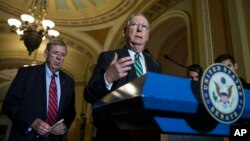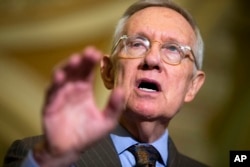Legislation to keep Washington’s chronic fiscal battles at bay through next year’s elections and beyond is expected to get Congress’ final approval by Friday.
The bill sets U.S. government spending levels for two years and raises the borrowing limit into early 2017, avoiding the threat of a partial federal shutdown or a costly U.S. debt default for the remainder of Barack Obama’s presidency.
The House of Representatives approved the measure Wednesday, and the Senate is likely to follow suit within 24 hours. Republicans control both chambers and have been at loggerheads with Democrats on fiscal matters for years.
“This agreement isn’t perfect,” said Senate Majority Leader Mitch McConnell, who took part in weeks of negotiations between congressional leaders and the White House to hammer out the deal.
Despite flaws, McConnell said the bill “rejects tax hikes, secures long-term savings through entitlement reforms, and provides increased support for our military.”
“Each of these items was a Republican goal heading into the negotiation,” he added.
'Not ideal'
Democratic Leader Harry Reid agreed with McConnell that the bill is not ideal.
“But this budget agreement accomplishes two major priorities that Democrats have long supported,” Reid said. “Number one, it promotes economic growth by providing relief from sequestration’s damaging cuts for two years. And it ensures we invest equally in the middle class and the Pentagon.”
The bill cancels tens of billions of dollars in automatic spending cuts, known as sequestration, that were imposed on military and domestic programs in 2013. Overall, federal spending would rise $80 billion above sequester levels over the next two years.
To pay for the spending boost, the bill seeks cost savings from programs that benefit America’s elderly and boosts revenue through a series of one-time measures, such as the sale of oil from the government’s emergency petroleum reserve.
In the House, moderate Republicans joined with Democrats to pass the bill, overcoming fierce opposition from ultra-conservatives. A similar voting dynamic is expected in the Senate, where conservative Republicans denounced the deal as fiscally irresponsible and a surrender to Democrats.
Ultra-conservatives
“I oppose this deal,” said Republican Senator Marco Rubio, who is running for president.
In a statement, Rubio said the bill “fails to seriously address the long-term drivers of our debt, [and] contains no fundamental reforms to stop Washington from spending money it doesn’t have.”
“We have leadership failure at the presidential level and a political establishment that keeps negotiating deals behind closed doors that will only leave our children and grandchildren saddled with more debt,” Rubio added.
Fellow Republican Senator Orrin Hatch, himself a fiscal hawk, said the deal is the best that could be achieved in an era of divided government.
“If you are going to wait for that perfect bill to come around, my experience has taught me that you are likely to wait a very, very long time,” Hatch said.













